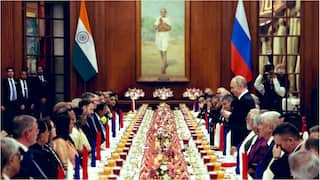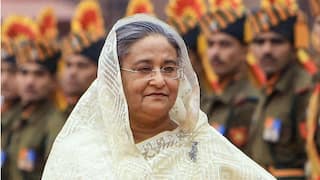All Eyes On India, Leader Of Global South, As G20 To Focus On Health Architecture, Digital Transformation
G20 showed its utility after the 2008 slowdown. A similar unity of efforts is needed now during the Bali summit, followed by New Delhi in 2023, to pull the world economy out of deep recession.

India is making extensive preparations to successfully host next year’s G-20 Summit under its presidency. The world’s focus right now, however, is on the 17th G-20 Summit set to be held in Bali, Indonesia, on November 15 and 16. The Bali summit will give an opportunity to the leaders of the world’s top developed and leading developing countries to collectively decide on investment and other measures to be taken to alleviate the concerns relating to climate change and deteriorating socioeconomic conditions, in the aftermath of the Covid-19 pandemic and as an impact of the Russia-Ukraine war.
While Russian President Vladimir Putin will not be physically attending the Bali summit, all eyes would be on Indian Prime Minister Narendra Modi, along with US President Joe Biden and Chinese President Xi Jinping. PM Modi is projected to be the voice of the Global South, i.e. poor developing countries, during the G-20 summit.
Accordingly, the theme of India’s G-20 Presidency — “Vasudhaiva Kutumbakam” or “One Earth One Family One Future” — has been drawn from the ancient text of the Maha Upanishad. Essentially, the theme affirms the value of all life — humans, animals, plants, and microorganisms — and their interconnectedness on the planet Earth and in the wider universe.
Global Health Architecture, Food Security And Expectations From India
The theme of the Bali Summit is “Recover Together, Recover Stronger”, very appropriate in the context of the Covid-19 pandemic and the Ukraine war. As the Bali summit has prioritised three major areas for discussion — global health architecture, sustainable energy transition and digital transformation, India will be playing a crucial role in promoting multilateral cooperation in these sectors, which affect the common man and a country’s economy.
Global health architecture is defined as the “relationship between the many different actors engaged in global health and the processes through which they work together”. On this front, India has already set an example before the world by supplying millions of doses of Covid vaccines the world over. As the ‘pharmacy of the world’, India is already making available low-cost medicines to poor countries from Asia to Africa.
The G-20 was set up with an aim to promote economic cooperation among developed and developing nations for equitable and sustainable growth of the world economy. The group is made up of 19 countries and the European Union. The 19 countries are Argentina, Australia, Brazil, Canada, China, Germany, France, India, Indonesia, Italy, Japan, the Republic of Korea, Mexico, the Russian Federation, Saudi Arabia, South Africa, Turkey, the UK, and the US. The Bali summit, being held in the backdrop of the Russia-Ukraine war, the pandemic and the catastrophic impacts from climate change, will deliberate on various economic measures for revival of the world economy. The agitated members of the south would naturally be raising issues like economic implications of these historic developments for the world, especially in the Global South. As a voice of the Global South, India is expected to raise issues of concern to developing countries at the G-20 fora.
The unprecedented food and energy crisis along with disruption in the supply chain due to the Russia-Ukraine war and the pandemic are the principal causes of present financial turmoil the world over. To mitigate the situation, the world first needs to eradicate the root causes that have derailed the world economy. This would be a contentious issue as those responsible for the crisis are expected to defend their acts and misdeeds.
The Bali summit will act as a cushion for the New Delhi summit next year, as much of the anger against Russia is likely to dissipate by then. India expects to host the G-20 Summit in a cordial atmosphere, in contrast to Bali where there would be an air of tension over the Ukraine situation.
Russia took devastating military action against Ukraine in February this year, which invited punitive international sanctions. This led to retaliatory action by Russia as it limited petroleum exports and stopped grain exports from Ukraine, causing artificial shortage not only of grains but also of petroleum products, which in turn resulted in huge adverse impact on food and fuel prices in many countries. The G-20 Summit is expected to take remedial measures to tackle these issues.
ALSO READ: Global Food Security To Climate Change: India Can Be A Role Model As G20 President
Joint Efforts Needed To Lift World Economy Out Of Deep Recession
Since its formation in 1999, the G-20 has been meeting every year, initially with finance ministers and later elevated to the level of the heads of states. Since 2008, G-20 leaders have leveraged the global macroeconomic environment for recovery and growth. The Russia-Ukraine war and the Covid pandemic have shown that adverse impacts on economic stability are also caused by non-economic measures. It will be a massive challenge for the leaders of developed and developing countries to come together to find common solutions to alleviate the sufferings of common people. India, being projected as the voice of the Global South, is expected to play a significant role in prodding the developed world to be generous in lifting the world economy out of deep morass.
To revive the world economy, the G-20 must push multilateral cooperation in infrastructure development. New Delhi is likely to take forward G-20’s agenda of building a policy toolkit to mobilise financing mechanisms to accelerate infrastructure investment opportunities. In view of China’s opaque infrastructure projects in various developing countries, resulting in a debt trap for the recipient countries, India is likely to make a significant proposal to build a more congenial atmosphere to boost infrastructure investment by proposing to set up a Quality Infrastructure Investment Database.
Considering the huge transformation in the digital economy, the vital issue of digital data and privacy needs to be addressed comprehensively. India being a digital power, the developing world expects it to take a lead in protecting their sovereign interests from big players like Meta, Google, Amazon, Microsoft, Apple etc. The Bali summit is expected to take up this issue of advancing digital transformation in a secure manner. India is also ensuring that interests of developing countries are safeguarded while discussing cross-border flow of data. As governments are demanding more authority on and autonomy of the data generated by them, G20 would be an important forum to discuss data flow and sovereignty.
The G20 has already shown its utility after the 2008 financial meltdown, when its members coordinated efforts through the Financial Stability Board to increase the resilience of global financial system, due to which the G-20 was able to stabilise financial markets through a series of financial and market stimuli that averted a major economic depression. A similar unity of efforts are needed during the Bali summit, followed by New Delhi, to pull the world economy out of deep recession.
The author is a senior journalist and strategic affairs analyst.
[Disclaimer: The opinions, beliefs, and views expressed by the various authors and forum participants on this website are personal.]







































